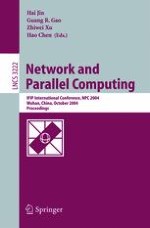2004 | OriginalPaper | Chapter
A Fully Adaptive Fault-Tolerant Routing Methodology Based on Intermediate Nodes
Authors : N. A. Nordbotten, M. E. Gómez, J. Flich, P. López, A. Robles, T. Skeie, O. Lysne, J. Duato
Published in: Network and Parallel Computing
Publisher: Springer Berlin Heidelberg
Included in: Professional Book Archive
Activate our intelligent search to find suitable subject content or patents.
Select sections of text to find matching patents with Artificial Intelligence. powered by
Select sections of text to find additional relevant content using AI-assisted search. powered by
Massively parallel computing systems are being built with thousands of nodes. Because of the high number of components, it is critical to keep these systems running even in the presence of failures. Interconnection networks play a key-role in these systems, and this paper proposes a fault-tolerant routing methodology for use in such networks. The methodology supports any minimal routing function (including fully adaptive routing), does not degrade performance in the absence of faults, does not disable any healthy node, and is easy to implement both in meshes and tori. In order to avoid network failures, the methodology uses a simple mechanism: for some source-destination pairs, packets are forwarded to the destination node through a set of intermediate nodes (without being ejected from the network). The methodology is shown to tolerate a large number of faults (e.g., five/nine faults when using two/three intermediate nodes in a 3D torus). Furthermore, the methodology offers a gracious performance degradation: in an 8 × 8 × 8 torus network with 14 faults the throughput is only decreased by 6.49%.
